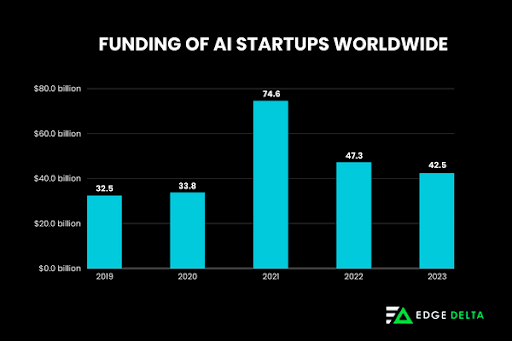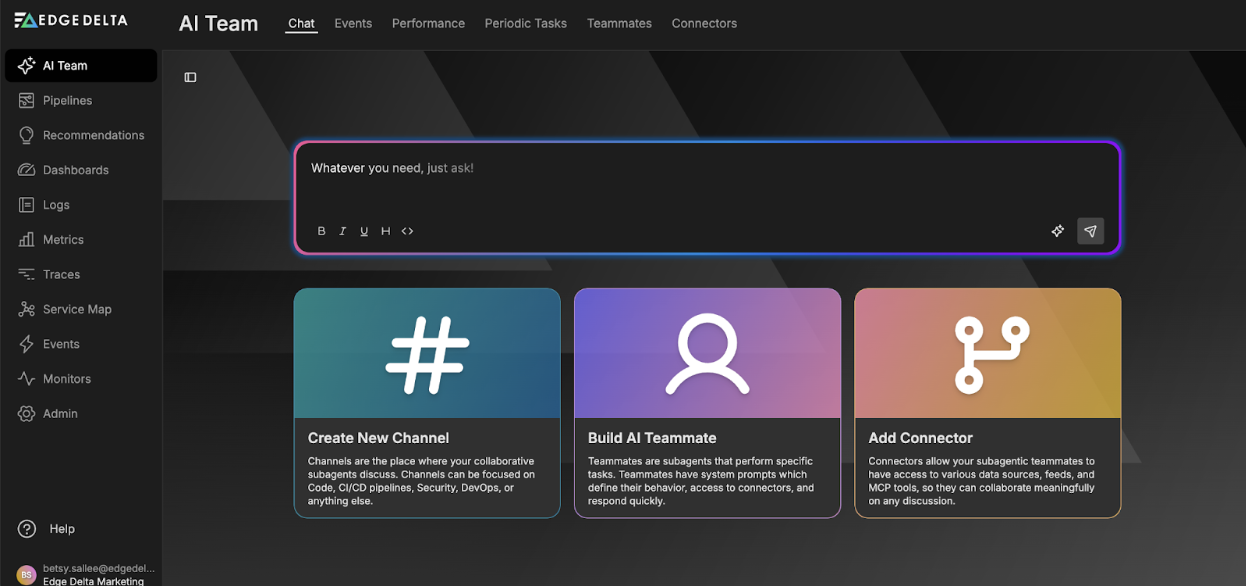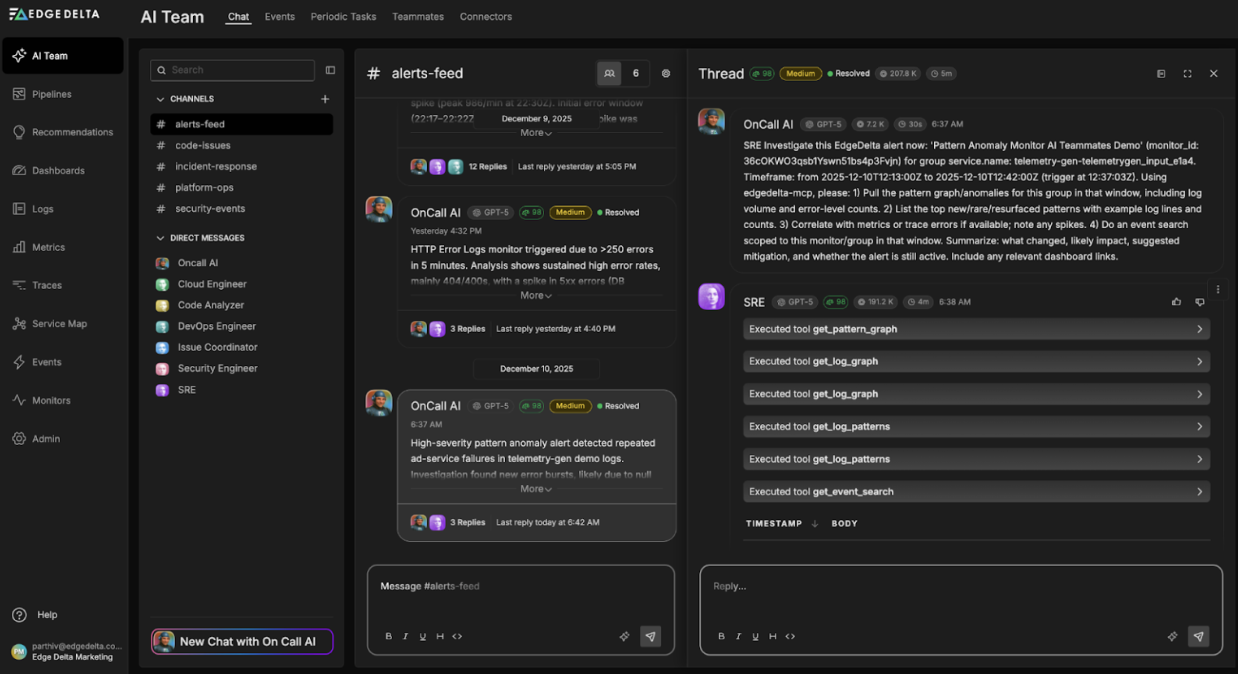There has been a notable increase in AI startups emerging worldwide. This can be attributed to advances in deep learning and neural networks, a lower barrier of entry due to the availability of AI tools, and an increase in AI-specialized compute hardware.
The rising number of AI startups reflects this rapid innovation in AI. It also shows the increasing appetite among investors for groundbreaking technologies. In the US alone, AI startups received $23 billion in 2023.
Want Faster, Safer, More Actionable Root Cause Analysis?
With Edge Delta’s out-of-the-box AI agent for SRE, teams get clearer context on the alerts that matter and more confidence in the overall health and performance of their apps.
Learn MoreTake a closer look at the AI landscape by delving deeper into the latest AI startup statistics. Explore their distribution, impact, and potential in this article.
Editor’s Choice
- The US is the home to the most AI startups originating between 2013 and 2022.
- Asia’s most funded AI startups are in China.
- AI startup funding reached $42.5 billion in 2023.
- OpenAI was the highest funded machine learning operations platform in 2024.
- As of March 2024, the AI industry had 214 unicorns worldwide.
Breaking Down the Numbers: How Many AI Startups Are There?
The AI market is expected to reach $184 billion by the end of 2024. Forecasts say that it will reach $826.70 billion by 2030, growing 28.46% annually. This rapid development creates rich ground for the 70,717 AI startups worldwide.
As the market continues to expand, AI startups are in a good position to capitalize on new opportunities. Find out more about AI startups with the latest statistics below.
Exploring the Global Hotspots for AI Startups
The availability of financial capital is crucial for the growth of any startup. This is why Silicon Valley in the US and Bangalore in India attract more AI startups. These areas often host a large number of investors who are interested in funding cutting-edge technologies, especially AI.
Here are some reasons why some countries or regions are better for AI startups than others:
| Aspect | Description |
|---|---|
| Robust STEM Education | AI startups need skilled machine learning and data science professionals to succeed. Countries with robust STEM education systems can supply the talents required. |
| Regulatory and Government Support | Government grants, tax incentives, and R&D subsidies boost AI startups, while strict data privacy laws hinder them. |
| Ecosystem and Network | AI startups thrive in dynamic ecosystems with other startups, tech companies, academic institutions, and governments. These networks encourage growth through collaboration, mentorship, and partnerships. |
Continue reading to learn more about the setting of AI startups worldwide.
1. The United States ranks first among countries with the most AI startups.
(Visual Capitalist, StanfordUniversity)
The US has consistently been the breeding ground for most AI startups. Between 2013 and 2022, there were 4,633 AI startups in the country. In 2022 alone, 524 AI startups were founded in the US, attracting $47 billion in non-governmental funding.
Here are the top 10 countries with the most AI startups:
| Country | Number of Startups (2013-2022) | Private Investment (2013-2022) |
|---|---|---|
| United States | 4643 | $249B |
| China | 1337 | $95B |
| United Kingdom | 630 | $18B |
| Israel | 401 | $11B |
| Canada | 341 | $9B |
| France | 338 | $7B |
| India | 296 | $8B |
| Japan | 294 | $4B |
| Germany | 245 | $7B |
| Singapore | 165 | $5B |
The US is also the top source of the best AI models. In 2023, 61 notable AI models emerged from US-based institutions, far outnumbering the 21 models from the European Union and the 15 from China.
2. In 2023, the US took first place in private sector AI investment rankings.
(Business Korea, CB Insights)
The US topped the private sector AI investment rankings in 2023 with $67.22 billion. China ranked second with $7.76 billion, while South Korea came in ninth with $1.39 billion.
AI funding slipped 29% in Europe, while it fell a whopping 61% in Asia. The US continues to lead in AI deals worldwide, holding nearly half of the shares.
3. In Asia, China has the most number of AI startups.
(Techinasia)
China dominates the top 50 AI startup list in Asia, receiving the highest funding in the region. Here’s a table of the top Asian countries with the most startups:
| Country | Number of AI Startups |
|---|---|
| China | 24 companies |
| India | 10 companies |
| Japan | 4 companies |
| South Korea | 4 companies |
The company that received the highest funding in China was Minimax. It is currently developing a Chinese version of ChatGPT. Minimax’s total funding to date amounts to $850 million. Following it is Baichuan Intelligent Technology, Enflame, and others. Israel’s AI21 Labs ranked fourth with $272 million.
Check out the next section to find out more about the trends in AI startup funding worldwide.
How Much Funding Go to AI Startups in 2024?
Funding is a crucial aspect for AI startups since AI demands significant investment in research, development, and talent acquisition. AI startup funding fuels the technical and operational aspects of AI businesses.
In 2023, the total funding for AI startups amounted to $42.5 billion. It has shown a slight decrease from the $47.3 billion in 2022. Here’s a graph showing the global funding of AI startup companies from 2019 to 2023:

4. US accounts for over 50% of the global funding for AI startups.
(Statista)
This significant share of the US in AI startup funding can be attributed to the broader economic challenges faced globally. Investors typically choose more stable and reliable markets. With the strength of the US dollar, the country provides a substantial advantage that appeals to most investors and entrepreneurs.
In 2023, Europe’s funding levels nearly returned to pre-pandemic levels, indicating a solid investment recovery. However, economic stability, currency strength, and investor confidence kept the US at the forefront of AI startup funding.
5. The most funded machine learning platform in 2024 was OpenAI.
(Statista)
OpenAI is the most financially supported AI startup, having raised over $12 billion by 2023. Key investors are Microsoft and Amazon.
Microsoft alone invested $1 billion in 2019, followed by another $10 billion in 2023. This investment helped OpenAI to continue developing safe and beneficial AI technology.
6. Generative AI holds almost 50% of all AI funding.
(CB Insights)
Generative AI accounts for 48% of total AI investment. This number is a significant increase from 2022 when generative AI startups garnered only 8%. Massive funding rounds from LLM developers like OpenAI, Anthropic, and Inflection drove this surge in 2023.
The resilience of AI funding, particularly in generative AI, helped mitigate the impact of the broader venture capital contraction. The number of AI deals decreased by 24% year-over-year. It seems less pronounced than the 30% reduction in total venture deal volume, but the decline is still significant.
The US and Canada had 11 deals that collected $974.9 million. Europe came next with $608.6 million across six deals. The European deal value was mainly tied to a single funding round for German generative AI startup Aleph Alpha GmbH.
| Regions | Aggregate Transaction Value | Number of Deals |
|---|---|---|
| US and Canada | $974 million | 11 |
| Europe | $608.6 million | 6 |
| Asia-Pacific | $378.9 million | 3 |
| Middle East | $219 million | 2 |
7. Investors have poured $330 billion into AI/ML startups.
(Pitchbook)
Investors placed $330 billion into around 26,000 AI and machine-learning startups over the past three years. This is two-thirds more than the amount they spent on 20,350 AI companies from 2018 through 2020.
From Vision to Reality: Success Rate of AI Startups in 2024
As of March 2024, the AI sector boasts 214 unicorns worldwide. These unicorns have demonstrated success and growth in the AI industry. Read on to gain more insight into the success rates of AI startups.
8. Of the 95 companies that joined the Unicorn Club in 2023, one-fifth are from the AI sector.
(Crunchbase)
The unicorns from the AI industry have collectively added over $35 billion in value to the global unicorn club. According to geography, the US produced almost half of these new unicorns. 24 were from China, while India and the United Kingdom had three.
20 new AI companies joined the global unicorn list in 2023, and three more in the first quarter of 2024. That brings the total number of AI startups valued at $1 billion or more to 214.
OpenAI is the most valuable among them, with a valuation of $80 billion as of March 2024. This figure is $15 billion higher than the Chinese e-commerce behemoth Stripe or the US payment provider Stripe.
Failure Rates of AI Startups
Not all AI startups are destined for success. According to a major investor, 85% of AI startups will fail within three years.
Investors saw two reasons for the high failure rates: startups are either swallowed by big companies, or they run out of cash. This stark forecast shows the high-risk environment for AI startups.
9. Around 90% of AI startups fail, with many not surviving past their first few years.
(Failory)
The failure rate for AI startups is significantly high, with 90% not even surviving their first few years of operations. It can be attributed to a variety of factors, including:
- Insufficient cash flow
- Poor product-market fit
- Inadequate marketing strategies
- Team-related issues
Conclusion
AI startups have shown remarkable growth and innovation over the years, impacting various industries. Funding growth shows investor confidence in AI’s transformative potential. With significant growth and innovation across numerous sectors, the US has established itself as a top hub for AI startups.
It is exciting to see some startups achieve unicorn status. However, while some startups succeed, many still fail and never reach such heights. The success of AI startups depends on their ability to overcome challenges while pushing technological boundaries as the AI landscape evolves.
AI Startup FAQs
How many startups are using AI?
35% of global companies report using AI in their business. Interestingly, 42% of companies are exploring AI use, and over 50% of companies plan to incorporate AI technologies in 2024.
How is AI helping startups?
The transformative role of AI in startups empowers small businesses to compete with industry giants, innovate, and create a better future. Benefits include increased efficiency, driving innovation, and competitive advantage.
How will AI change startups?
AI changes startups by enabling more efficient operations, enhancing data analysis capabilities, and creating new product opportunities. It can also reduce costs and barriers to entry, speed up decision-making, and personalize customer interactions.
Why are AI startups important?
AI startups are vital because they drive innovation in technology. They create new job opportunities and solve complex problems. AI startups contribute to economic growth and have the potential to make significant advances in various industries.








